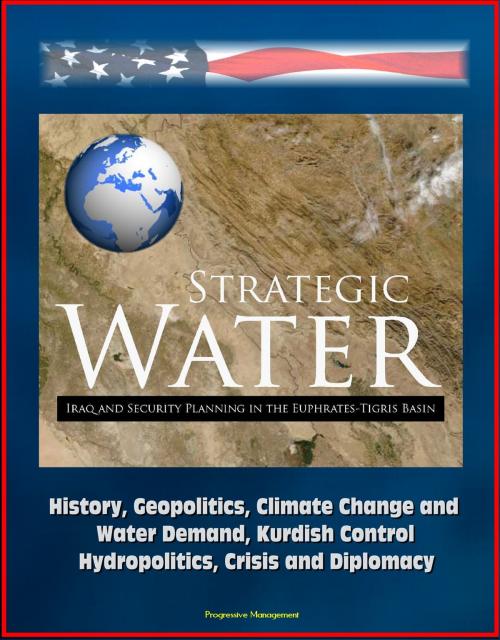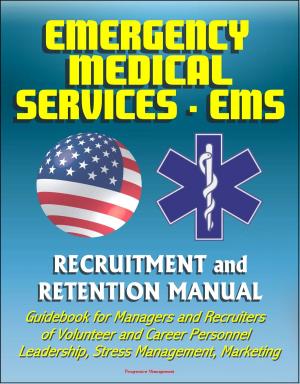Strategic Water: Iraq and Security Planning in the Euphrates-Tigris Basin - History, Geopolitics, Climate Change and Water Demand, Kurdish Control, Hydropolitics, Crisis and Diplomacy
Nonfiction, History, Middle East, Military| Author: | Progressive Management | ISBN: | 9781310408182 |
| Publisher: | Progressive Management | Publication: | August 21, 2015 |
| Imprint: | Smashwords Edition | Language: | English |
| Author: | Progressive Management |
| ISBN: | 9781310408182 |
| Publisher: | Progressive Management |
| Publication: | August 21, 2015 |
| Imprint: | Smashwords Edition |
| Language: | English |
Professionally converted for accurate flowing-text e-book format reproduction, this U.S. Marine Corps (USMC) publication provides a detailed analysis of water and security issues in the Euphrates-Tigris basin, based on open-source reporting and focused on the issues identified by the U.S. Intelligence Community in 2012.
After the final phase of drawdown of U.S. troops in Iraq, it is important to do what we can to help maintain a level of stability and to look ahead to emerging security threats. Strategic Water: Iraq and Security Planning in the Euphrates-Tigris Basin by Frederick Lorenz and Edward J. Erickson makes an important contribution to this effort by taking a close look at a serious problem that is often neglected—the decline in freshwater availability and its impact on regional security. With convincing authority, the authors make it clear that the situation in Iraq is deteriorating much faster than expected, and in a few years much of Iraq's water supply will be un-drinkable, largely due to high salinity levels. This book not only predicts a crisis, it provides some details on what that crisis might look like: an ugly mix of human suffering, governmental instability, population movement, and a rise in extremist violence. Despite the fact that the United States may have less influence in Iraq in the short term, we cannot deny that it remains a vital U.S. interest to keep the region secure. And there are things that can be done in the short term to help avoid the worst-case scenario.
Environmental security is an emerging mission for the U.S. military; for these nontraditional missions, we need problem solvers and innovators. We have to constantly look beyond the short-term problems and try to identify the security issues that will become critical in the years ahead. In the Euphrates-Tigris basin we have an extraordinary situation when the actions of our NATO ally, Turkey, might negatively impact the water supply in the country we have worked so hard to stabilize, Iraq. Ineffective water management from a lack of experience and a lack of modern technology is only part of the problem. Cultural barriers exist to efficient water use, and Islamic tradition tells us that water should not be sold or controlled. As we look to each new crisis, there seems to be an underlying element of water or resource scarcity that seems to make the problem unsolvable.
This book not only identifies a threat that is not often analyzed, it also makes detailed recommendations on how to deal with it effectively. In the final chapter, Lorenz and Erickson prioritize what needs to be done and describe the relative cost and probable chance of success for each option. For each alternative, they provide a definition of "success" and the probable impact if progress is made. Two key recommendations are emphasized: the need for better coordination of our efforts and more effective use of technology—the science and diplomacy linkage.
Chapter 1 - The Euphrates-Tigris Basin and Its History * Chapter 2 - Geopolitics in the Euphrates-Tigris Basin * Chapter 3 - Projected Water Demand and the Impact of Climate Change * Chapter 4 - Iraq and the Hidden Issue: Kurdish Control of the Tigris * Chapter 5 - Hydropolitics * Chapter 6 - Law, Science, and Diplomacy * Chapter 7 - The Approaching Crisis and a Framework for Action
Professionally converted for accurate flowing-text e-book format reproduction, this U.S. Marine Corps (USMC) publication provides a detailed analysis of water and security issues in the Euphrates-Tigris basin, based on open-source reporting and focused on the issues identified by the U.S. Intelligence Community in 2012.
After the final phase of drawdown of U.S. troops in Iraq, it is important to do what we can to help maintain a level of stability and to look ahead to emerging security threats. Strategic Water: Iraq and Security Planning in the Euphrates-Tigris Basin by Frederick Lorenz and Edward J. Erickson makes an important contribution to this effort by taking a close look at a serious problem that is often neglected—the decline in freshwater availability and its impact on regional security. With convincing authority, the authors make it clear that the situation in Iraq is deteriorating much faster than expected, and in a few years much of Iraq's water supply will be un-drinkable, largely due to high salinity levels. This book not only predicts a crisis, it provides some details on what that crisis might look like: an ugly mix of human suffering, governmental instability, population movement, and a rise in extremist violence. Despite the fact that the United States may have less influence in Iraq in the short term, we cannot deny that it remains a vital U.S. interest to keep the region secure. And there are things that can be done in the short term to help avoid the worst-case scenario.
Environmental security is an emerging mission for the U.S. military; for these nontraditional missions, we need problem solvers and innovators. We have to constantly look beyond the short-term problems and try to identify the security issues that will become critical in the years ahead. In the Euphrates-Tigris basin we have an extraordinary situation when the actions of our NATO ally, Turkey, might negatively impact the water supply in the country we have worked so hard to stabilize, Iraq. Ineffective water management from a lack of experience and a lack of modern technology is only part of the problem. Cultural barriers exist to efficient water use, and Islamic tradition tells us that water should not be sold or controlled. As we look to each new crisis, there seems to be an underlying element of water or resource scarcity that seems to make the problem unsolvable.
This book not only identifies a threat that is not often analyzed, it also makes detailed recommendations on how to deal with it effectively. In the final chapter, Lorenz and Erickson prioritize what needs to be done and describe the relative cost and probable chance of success for each option. For each alternative, they provide a definition of "success" and the probable impact if progress is made. Two key recommendations are emphasized: the need for better coordination of our efforts and more effective use of technology—the science and diplomacy linkage.
Chapter 1 - The Euphrates-Tigris Basin and Its History * Chapter 2 - Geopolitics in the Euphrates-Tigris Basin * Chapter 3 - Projected Water Demand and the Impact of Climate Change * Chapter 4 - Iraq and the Hidden Issue: Kurdish Control of the Tigris * Chapter 5 - Hydropolitics * Chapter 6 - Law, Science, and Diplomacy * Chapter 7 - The Approaching Crisis and a Framework for Action















